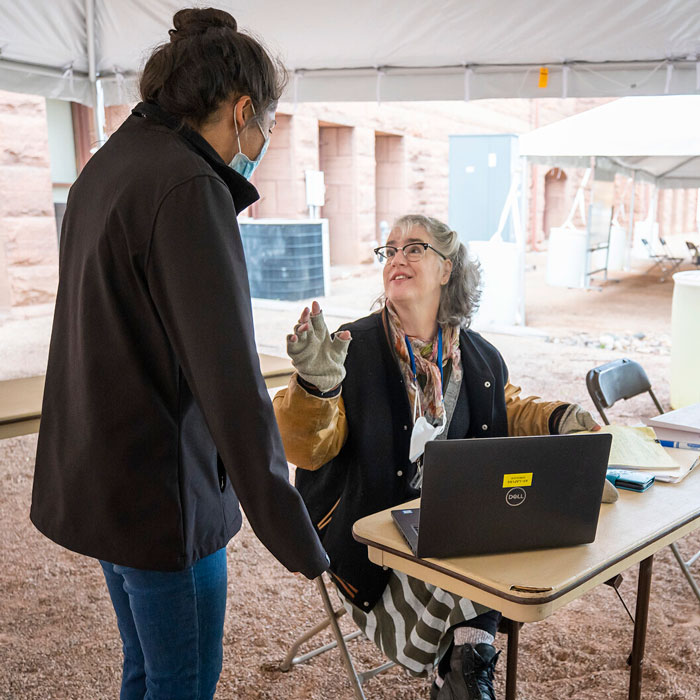At first glance, the classes Construction of Social Problems and Art and the Museum may not appear to have much in common. But as part of the new CC100 thematic cluster, The Dynamics of Power, they share the same focus as they examine a single topic through different, but intersecting, lenses.
The five-class collaborative is one of the many new First-Year Program options available to students in their first block at CC. Each provides the new college students with a comparative, interdisciplinary introduction to liberal arts scholarship on the Block Plan. And, ultimately, the academic approach helps first-year CC students make more informed choices about how and with what focus they pursue their education, career, and impact on the world.
“Every student takes a course in a department or program, but each professor is charged with exposing the students to another field and how they look at that issue,” says Gail Murphy-Geiss, professor and chair of the Sociology Department. “In high school, students had to take all these classes, and they think the world is divided up into these disciplines. And it is, but a lot of the most interesting work happens in the cracks. That's what liberal arts is all about.”
Over the course of the block, students in Murphy-Geiss’s Construction of Social Problems visited presentations by professors in the Sociology, Anthropology, Southwest Studies, and Art departments to learn how each discipline examines and discusses power. At the end of the block, all 80-100 students from The Dynamics of Power cluster created poster presentations and gathered at the Colorado Springs Fine Arts Center at Colorado College to share and discuss them.
The poster presentation format is unique to the Dynamics of Power cluster, but the interdisciplinary approach to General Education is shared by all first-year students. The First-Year Program launched in the 2020-21 academic year, and students select a first block CC100: Critical Inquiry Seminar. Other CC100 themes for 2021 Block 1 include Global Exchange, Technologies of the Body, and Transcultural and Intersectional Identities.
“These courses are designed primarily to teach students about the nature of disciplines and how they relate to a liberal arts education,” says Aaron Stoller, assistant vice provost and director of academic programs.
By disrupting preconceptions and provoking questions that reach across departmental structures, CC100 clusters are designed to expand students’ view of learning and introduce them to a variety of disciplines, or particular ways of asking and answering questions. “In order to be empowered to make informed curricular choices about what they want to major in, and to be able to do authentic things in the disciplines, students need to understand what they are getting themselves into and the choices available to them,” Stoller says.
The innovative approach is more expansive than what most first-year students have known previously and one they seem to find appealing as they embrace the CC experience in The Dynamics of Power cluster.
“Just talking about the dynamics of power is a lot different from what I experienced in high school. And it’s been super great to learn about different social issues,” says Mahima Chiles ’25 from Colorado Springs, Colorado. “I think it will be really cool learning about the different lenses of sociology.”
“I’m interested in computer science, and I’ve never been able to take an art history class in high school,” says Mira Giles-Pufahl ’25 from Milwaukee, Wisconsin. “So I was really excited to see this class and see art, which I’m interested in, and also power dynamics and the ethics of art and museums.”
In sociology and art classes early in Block 1, students readily shared their perspectives in small group discussions. They appeared eager to engage with each other and the material that was organized around issues shaping culture in real time.
“[The Dynamics of Power cluster] gave an opportunity to talk about something that I haven’t actually experienced before and to look at it in a new perspective,” says Claire O’Donnell ’25 from Baltimore, Maryland. “We’ve talked about issues, but usually only from a historical perspective, not necessarily sociology. And I thought that it was really interesting, especially coming out of a [pandemic] year of not being able to talk to anybody or really talk about issues that are prevailing in our society.”
The innovative content organization has been challenging but freeing for faculty as well.
“My hope for the students is that they have a really compelling first-block experience — that they are challenged and excited and in the wilderness and bothered and all the great things that can happen when you first arrive at college,” says Rebecca Tucker, professor and director of the Art Department. “I think the value of this model is that it structures a cross-disciplinary way of thinking right from the beginning of their career at CC.”
“I do hope all the students find their calling — not their discipline, but their calling, something that calls you, that you just can’t shake,” Murphy-Geiss says. “And then they figure out what they need to put together at Colorado College to get there.”






